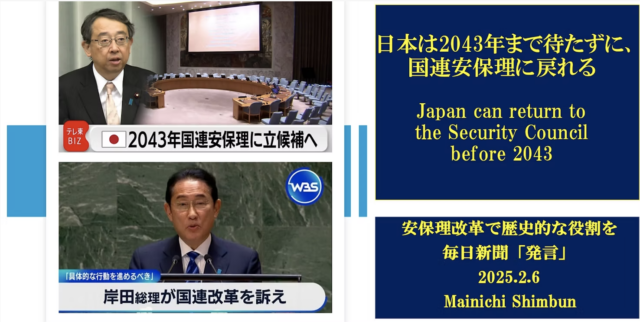
To make the UN Security Council more representative, inclusive, transparent, effective, democratic, and accountable, as advocated by the Pact for the Future adopted by the Summit for the Future, the Intergovernmental Negotiations (IGN) is considering the possibility of increasing the seats of the Security Council by 10-11. In light of this development, Japan can play a historic role by proposing an increase of 10 seats with 5-year re-electable terms and becoming a member of the Security Council without waiting until 2043. For more information, click here. (10/2/2025)
The following is an English translation of Mr. Hasegawa’s comments.
Proposal for Japan to Play a Historic Role in Reforming the Security Council
Sukehiro Hasegawa
At the “Summit for the Future” held at the United Nations Headquarters in New York last September, world leaders adopted the “Pact for the Future.” The Pact called for the reform of the Security Council to become more representative, inclusive, transparent, effective, democratic, and accountable. Japan should take this opportunity to demonstrate its historic leadership by taking a two-step approach to Security Council reform.
In the first phase, the Intergovernmental Negotiations (IGN), having agreed on expanding the Security Council, should now be persuaded to reach a compromise on the number, distribution, and categories of additional seats.
Several groups are active in the IGN, including the G4, the African Union, the Uniting for Consensus Union (UfC), the pro-reform Developing Countries known as L69, the Arab League, and the Caribbean Community.
Japan has strongly promoted the idea that the G4 countries of Japan, Germany, India, Brazil, and two other African countries will become permanent members of the Council. However, there is strong opposition to increasing the number of permanent members. Furthermore, it is recognized that increasing the number of permanent members will strengthen the oligarchic nature of the Security Council. Therefore, to improve the Security Council’s accountability to the international community as a whole, Japan should seek to increase the number of seats on the Security Council by ten with five-year renewable terms. This approach would gain the support of the majority of member states, and Japan would be elected the new seat of the Security Council.
This year is the 80th anniversary of the founding of the United Nations. In this historic year, this proposal should be presented to the General Assembly as the first step in reforming the Security Council.
As the second step, when the UN celebrates its 100th anniversary in 2045, a General Conference of all member states should be held following Article 109 of the UN Charter to enact comprehensive reform of the UN system.
As part of this reform, the five seats occupied by the Security Council’s permanent members should be transformed into the most critically essential five seats for 10-year renewable seats with veto power. The holders of these seats should continue to hold veto power, given their decisive power in maintaining peace and security in the world. They can be UN member states without regard to geographical allocation and regional organizations. In other words, any UN member state or a major regional organization, such as the European Union (EU), the African Union (AU), or the Association of Southeast Asian Countries (ASEAN), can be elected to the five seats with a 10-year duration. They are the leading guardians of world peace and security.
Japan has served for two years, in 2023 and 2024, as a member of the UN Security Council and has played a significant role in examining such issues as Ukraine, the Gaza War, North Korea, and counterterrorism. Since joining the United Nations, Japan has aspired to obtain a permanent seat on the Security Council as an honorable position in the international community. Japan understandably hoped that the international community’s trust gained through peaceful diplomacy after World War II would enable it to obtain honorable status. It is now incumbent on Japan to make a paradigm shift and take a historic leadership role in making all members of the Security Council accountable to all countries and peoples of the member countries.




